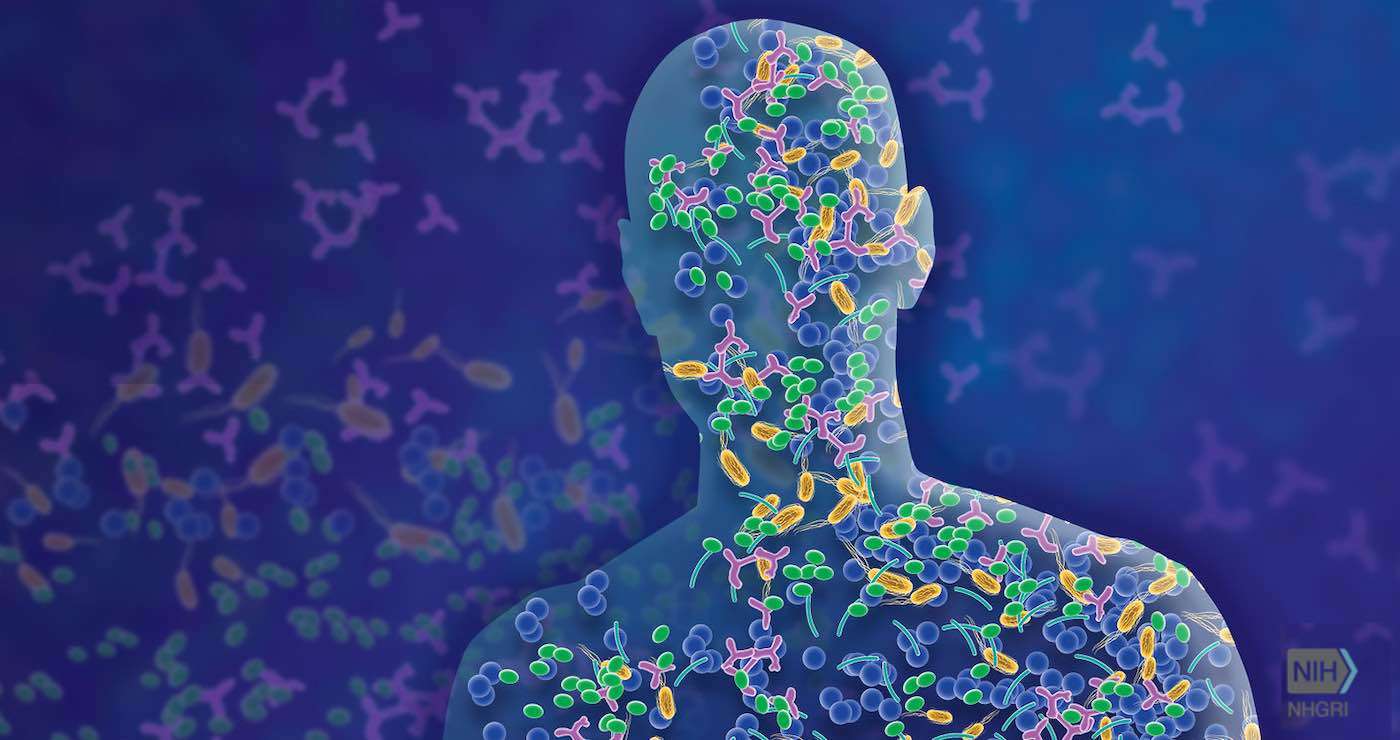Complimenting a Stranger is What We'd Most Like to Do in Public But Don't Have the Guts, Says Top 10 Survey
Complimenting a stranger in the street is the top thing adults would most like to do in public, but don't have the guts –Top 10 list.

Sponsored
You may have seen previous articles on WS that show the huge impact of the human microbiome on your health.
Every day, new products are getting launched on the market that feature ways to improve your gut health, but our overall health is tied to more than just the ‘gut' microbiome. In fact, the ‘human microbiome' is made up of over a dozen different regions of your body, ranging from your gut to your mouth, your skin, and everything in between.
This is because your body is home to trillions of microorganisms that do everything from strengthening your immune system to helping you regulate your hormones. Ultimately, these microbes work together with your cells to convert what you're eating into metabolites that can improve your health, or harm it.
In a plethora of different ways, you have your body's microbiota to thank for many aspects of your health (or lack thereof), which is why it continues to be one of the hottest scientific topics today.
As Dr. Martin J. Blaser, director of the NYU Human Microbiome Program, put it, "It's reasonable to propose that the microbiome and its activities are involved in most, if not all, of the biological processes that constitute human health and disease."
There are many microorganisms throughout your body. Archaea are ancient organisms and often produce methane. They also have the distinct ability to live in extreme environments like volcanic vents and acidic hot springs—including acidic parts of your digestive system.
You'll also find plenty of yeast and other fungi hanging out in there, and possibly other organisms that can directly or indirectly harm us. Eating foods that are infected with plant viruses can lead to low-grade inflammation in the gut. But perhaps the most interesting of all are bacteriophages, which infect specific bacteria.
What is fascinating, is what all these microbes are doing. Their actions can affect your health but we can modify those activities through personalized diet recommendations. By analyzing microbial activity, home testing kits can suggest an optimal diet.

The important thing to remember is that it isn't the food you eat but what your gut microbiome does with the food you eat that matters most when determining what foods are "healthy" for you.
In a recent clinical research study, individuals consuming similar foods showed big differences in their glycemic response. This means that when some people eat a banana, their body might respond like they had just eaten a piece of double-fudge chocolate cake—while others showed no effects at all.
The study revealed a new perspective on how the microbiome may be influencing changes in people's glycemic response and just how complex the interactions of our microbial ecosystems are between the foods we ingest and our bodies. It turns out, what the microbes are actually doing inside of you can contribute to your body's response to carbs, by buffering the level of sugar being released into the bloodstream—or even by spiking it.

It's not uncommon to overlook our oral cavity as the first step in digestion. Our stomach and our digestive tract do a significant amount of the work, so it's not unheard of to overlook the power of the teeth, saliva, tongue, and oral microbiome. Until recently, most specialists thought that all the bacteria in the mouth were harmful—thus, the number of mouthwashes on the shelf. But the reality is that the nose, mouth, and oral microbiome are essential to initiating many biochemical signals that jumpstart our digestion.
Now we know that the oral microbiome is incredibly important to more than just beginning the breakdown of our food. These microbes also lend a hand in regulating a number of other systems like our heart, our brain, and our gut microbiome to boot.
When our gut ecosystem is balanced and diverse, we see improved levels of short-chain fatty acids (SCFA's) like butyrate, propionate, and acetate. These byproducts from beneficial bacteria are shown to exhibit anti-inflammatory effects that help to regulate our immune response in the gut. They tackle this job in many ways, including preventing certain immune cells from getting carried away and banding together for a fight when they're not needed. They also help DNA transcription in our human cells, allowing for our cellular DNA to replicate and improve their ability to regenerate. This means faster wound healing and more opportunities for our skin cells to keep their elasticity, preventing wrinkles.
We were too quick to label certain bacteria like E. coli "bad guys," only to find out that certain strains at some levels can benefit us in our gut. In fact, E. coli are important for ensuring a lot of different ways to improve our health. For example, they stimulate regeneration of the gut lining, which can prevent toxic compounds from reaching our bloodstream.
Scientific researchers have been studying the Gut-Brain Axis for years: the complex interactions between the microbes in our gut and our brain. Our body has a direct link (like the vagus nerve that connects the central nervous system to the digestive tract) and many indirect links with the activity of our brain. Many of our neurotransmitters, like the hormones that control our brain's activity and our mood, are created inside the gut with the help of microorganisms that live there.
If you're feeling sad, or experiencing anxiousness or mood swings, or have difficulty focusing from brain fog, your microbiome may be partly to blame.
Not only are some home tests able to monitor how much some of these neurotransmitters are produced, but they're able to recommend foods that help support balance in your microbiome with effects that can trickle down to even your mood.

Life on earth evolved with microorganisms, but it also evolved with the sun. We rely on that fireball in the sky to help create important molecules inside our body like vitamin D. Important to the health of our bones, vitamin D is also an essential nutrient that works to help regulate our blood pressure and regulate our immune system.
There is a home test kit on the market that is able to determine if you have a low level of genetic transcripts that reflect your vitamin D status. This may mean more targeted vitamin D-rich foods in your recommendations or even added to your unique supplement recommendations.
Most people know that consuming too much salt can increase your blood pressure, but we now realize that salt can also impact the health of your gut microbiome. Certain beneficial or probiotic microbes found in our gut microbiome can find it difficult to colonize in a high salt environment, while other not-so-good microbes (that actually contribute to gas production) thrive in high-salt environments.
Your gut microbiome can reveal itself in a home test and personalized recommendations can help you rebalance your gut health.

We all digest foods in vastly different ways, including many of the bioactive compounds found inside them. Some of the microorganisms in our body may even take many of these seemingly ‘safe' or ‘healthy' foods and convert them into toxic compounds like Uremic-type toxins p-cresol and indoxyl sulfate. These compounds are often generated when an individual has a high population of uremic-producing bacteria that convert some amino acids commonly found in Tuna and Goat meat.
So for some people, it might actually be better to swap out Tuna-based sushi for other meats like steak and chicken or try your hand at perhaps some more exotic types of fish.
The amount of balance in your gut and oral microbiomes affects how well your body extracts energy and nutrients—and it is associated with a healthy metabolism. So when it comes to losing weight, you should eat to support the balance of those trillions of bacteria.
To find your ideal diet and get precise recommendations, you can seek to learn about your entire microbiome, not just the one in your gut.
Viome, a California company that has been in the forefront of this field for a decade, recently released its most advanced at-home test to date—The Full Body Intelligence Test. It's the first of its kind to analyze 3 key areas of your health as a whole—the gut microbiome, oral microbiome, and cellular health—to offer a holistic view of your total body health.
The test can give you powerful insights into your microbial health, as well as deliver precise, personalized nutrition recommendations of the foods that are best for your optimum health.
WS members can use code CURRENCY50 to get $50 off Viome's Full Body Intelligence Test by ordering online at the Viome website.
"Through its advanced technology developed from Viome's lab at the Los Alamos National Laboratory, we are working to create a therapeutic platform to support our mission to reverse and prevent chronic diseases," the company's founder Naveen Jain told WS.
"Our main goal is to readdress the healthcare system using nutrition as medicine. At Viome, we believe that the focus of health should not just be on the symptoms. It all starts by analyzing what's going on inside your gut."
What we know about microbes today can be the tip of our healthy iceberg. Don't forget to use code CURRENCY50 to get $50 off of Viome's Full Body Intelligence Test.
Be the first to comment